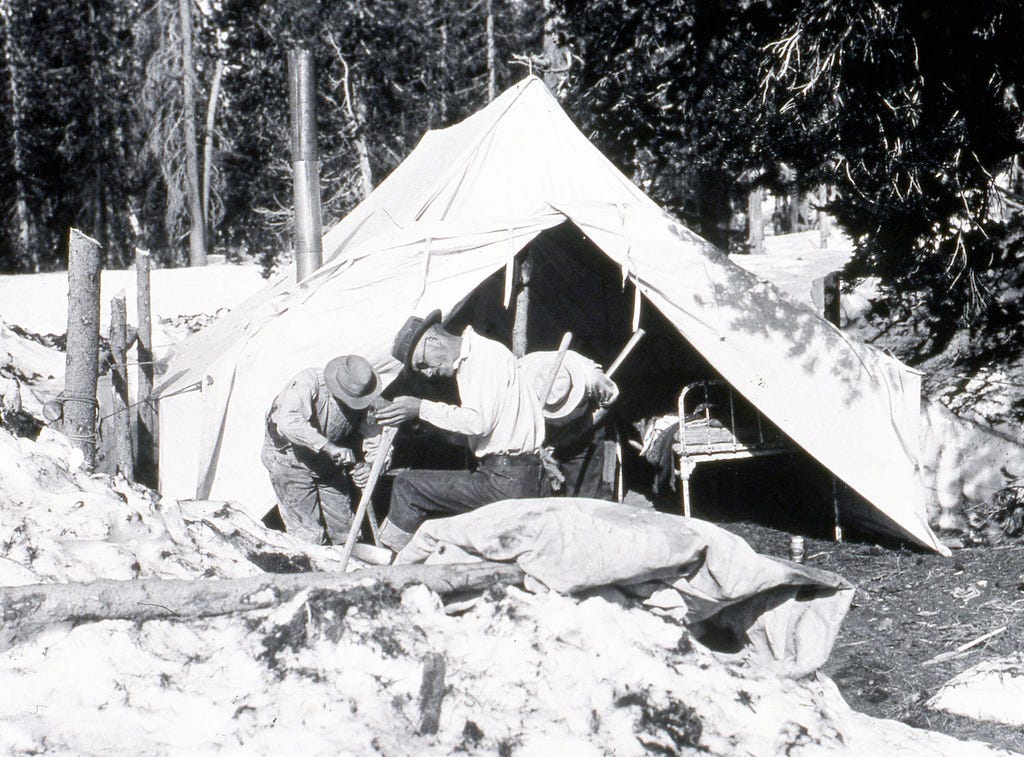What Does Sharpening Your Axe Actually Mean?
Think about your attitude and methodology before trying to understand the world
"1929. Some of the control crew sharpening axes. Munson beetle control camp, Crater Lake National Park, Oregon." by USDA Forest Service is marked with CC PDM 1.0
There is a famous quote that circulates on the internet where US President Abraham Lincoln allegedly says that if he had six hours to cut down a tree, he would spend the first four hours sharpening his axe. Sadly, Quote Investigator has found no evidence that Lincoln said this. He died in 1865 and the first record of the quote is from 1956. A volume on agricultural education quoted an anonymous woodsman with what appears to be the first version of the quote:
“A woodsman was once asked, ‘What would you do if you had just five minutes to chop down a tree?’ He answered, ‘I would spend the first two and a half minutes sharpening my axe.’ Let us take a few minutes to sharpen our perspective.”
Although it is a shame Lincoln never said these words, there is a huge amount of wisdom behind the anonymous woodsman’s words. Sharpening your axe might seem less exciting than chopping down a tree, but a blunt axe won’t get you very far. This project is called Sharpen Your Axe because I want to encourage readers to spend a little time thinking about methodology before trying to understand current affairs.
The approach we have developed so far has several levels. At the most general level, I have urged people to suspend judgement when faced with narratives that engage with our emotions. At the same time, we need to be distrustful of our first guesses and to be wary of cognitive dissonance when faced with contradiction. Doubling down on a poor starting position can take us in a dark direction.
The next level involves approaching the world in a probabilistic way like a Bayesian. We need to hold our views on a sliding scale and move them up and down as the evidence changes. This allows us to transcend a poor starting position. However, this will only work if we are scrupulously honest with ourselves and others. We need to check absolutely everything. Placing bets can help us refine our views and make sure they are connected to the real world.
The final level is based on reading several news sources but throwing away most of the commentary. If someone tells you to stop reading the newspaper consider it a red flag. Are you dealing with a con artist? Or a denialist? Or a guru? If so, are they trying to draw you into the anti-globalist community?
We have also seen several examples of what it means to yield a blunt axe, or get stuck into the material without worrying about methodology first. Conspiracy theories tend to act as bodyguards to poor starting positions; people yielding blunt axes often try to fit the evidence to a sweeping narrative; and trying to move backwards from an event to its alleged causes can be problematic. Online communities that nurture conspiracy speculation are often based on groupthink. Joining them can prove to be bad for your health.
One consequence of sharpening your axe instead of chopping down trees is that online debates become much less interesting. Why not change the conversation to methodology instead of conclusions? It might not be quite as satisfying as trying to have the last word in a social media battle, but if you are thinking about sharpening your own axe, why not try and help your friends, colleagues, family members and random acquaintances do the same?
Sharpen Your Axe is a project to develop a community who want to think critically about the media, conspiracy theories and current affairs without getting conned by gurus selling fringe views. Please subscribe to get this content in your inbox every week. Shares on social media are appreciated! If this is the first post you have seen, I recommend starting with the critical-thinking rabbit hole.
[Updated on 10 March 2022] Opinions expressed on Substack and Twitter are those of Rupert Cocke as an individual and do not reflect the opinions or views of the organization where he works or its subsidiaries.

